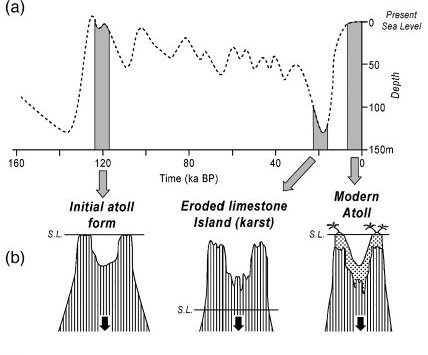Coral atolls face drowning threat from sea level rise
What the science says...
| Select a level... |
 Basic
Basic
|
 Intermediate
Intermediate
|
 Advanced
Advanced
| ||||
|
Thousands of coral atolls have "drowned" in the past when they were unable to grow fast enough to maintain a presence at sea level |
|||||||
Coral atolls grow as sea levels rise
Coral atolls don't always keep well enough to keep in touch with sea level. The ocean is littered with thousands of former coral reefs and atolls "drowned" after they failed to grow fast enough to match sea level. Being barely above sea level, reefs are particularly vulnerable to sea level rise.
Recent work shows that people living on coral atolls in the Pacific will suffer when sea level rises above the solid reef foundations. Waves will begin to pound and erode the atolls long before they are submerged.
Coral atoll formation
Coral reefs grow only in warm waters of the world, forming as generations of coral build upon the "bones of their ancestors". Given the right conditions coral are able grow fast enough to keep pace with moderate rates of sea level rise.
Charles Darwin first realized that coral atolls are the remains of submerged ocean volcanoes (Darwin 1842), with successive generations of coral growing on top of a slowly sinking volcano. This was later confirmed by deep drilling on coral atolls (Royal Society of London 1904, Ladd et al. 1953)
We now know that sea level has fluctuated a lot during the Quaternary ice ages of the last few million years, so the process is more complex than Darwin suggested. Reef building on atolls stops when sea level falls and resumes when sea level rises. This sequence has repeated itself with the arrival and departure of continental glaciation. The top 10 -15 metres of many atolls represent the "recent" growth during the current interglacial, the Holocene.

Figure 1. Atoll history through ice age sea level fluctuation. a) sea level thousands of years before & up to present. b) Atoll form relative to sea level. From Woodroffe 2008.
A long history of reef drowning
Just like Goldilocks, coral reefs are very picky. Growth can slow down when waters become too hot, too cool or too acidified (Flood 2001), (Scheibner & Speijer 2008). Guyots are drowned ancient coral atolls, and thousands of these lie beneath the Pacific sea surface.
Coral reef growth during the Holocene shows evidence of having "temporarily drowned" to a halt at some point. Many regions also harbour relict reefs which have permanently drowned during the Holocene. One vast relict complex exists in deeper water off the Great Barrier Reef for example.
Higher Pacific sea level in the Holocene
Around 8,500 years ago sea level caught up with the tops of the eroded atolls and new Holocene reef growth began to be cemented over the older reef foundations. Sea level reached a highstand in the Pacific between 4-2000 years ago (Dickinson 2003, Woodroffe & McLean 1998). Coral reef tops grew to this higher sea level but were exposed once local sea level fell again (Mitrovica & Milne 2002).
The end of atoll nations
Now that global sea level is again rising the solid foundations (reef flats) supporting the stable Pacific atolls will eventually be overtopped by the sea. Many of these flats are 0.5 to 1 metre above local high tide. Submerging these solid foundations will lead to the atolls being vulnerable to wave damage. Erosion will begin to sweep away the rubble, sediment and thin soils, making them uninhabitable. Dickinson (2009) estimates that by mid to late 21st century most atolls will be awash.
Homeless
Although they appear like permanent features, Pacific coral atolls have only existed for about two thousand years. These atolls are stable because the solid foundations protect them from major erosion. This protection is only likely to continue until mid century for some atolls. So, although coral atolls may indeed grow as sea level rises, this hasn't always been the case in the past, and won't be the case in the future.
This rebuttal was updated by Judith Matz in September 2021 to replace broken links. The updates are a result of our call for help published in May 2021.
Last updated on 12 March 2013 by Doug Bostrom. View Archives































 Arguments
Arguments






























Climate Myth...